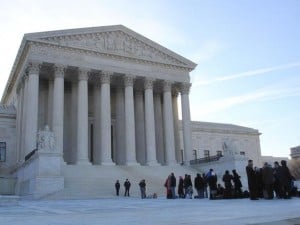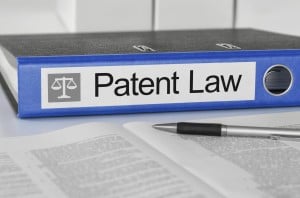David Lat
 David Lat, the founding editor of Above the Law, is a lawyer turned writer and speaker. You can read his latest writing about law and the legal profession by subscribing to Original Jurisdiction, his newsletter on the Substack platform. David's book, Supreme Ambitions: A Novel (2014), was described by the New York Times as "the most buzzed-about novel of the year" among legal elites. David previously worked as a federal prosecutor, a litigation associate at Wachtell Lipton, and a law clerk to Judge Diarmuid F. O'Scannlain of the U.S. Court of Appeals for the Ninth Circuit. You can learn more about David on his personal website; you can connect with him on Twitter (@DavidLat), LinkedIn, and Facebook, and you can reach him by email at davidlat@substack.com.
David Lat, the founding editor of Above the Law, is a lawyer turned writer and speaker. You can read his latest writing about law and the legal profession by subscribing to Original Jurisdiction, his newsletter on the Substack platform. David's book, Supreme Ambitions: A Novel (2014), was described by the New York Times as "the most buzzed-about novel of the year" among legal elites. David previously worked as a federal prosecutor, a litigation associate at Wachtell Lipton, and a law clerk to Judge Diarmuid F. O'Scannlain of the U.S. Court of Appeals for the Ninth Circuit. You can learn more about David on his personal website; you can connect with him on Twitter (@DavidLat), LinkedIn, and Facebook, and you can reach him by email at davidlat@substack.com. Posts by David Lat
-
 Non-Sequiturs
Non-SequitursNon Sequiturs: 05.05.19
* If you shared my skepticism that the murder trial in the Dan Markel case will actually start next month, almost five long years after Markel’s murder, then you won’t be surprised by this latest development — Saam Zangeneh, counsel to Sigfredo Garcia, has moved for a continuance. [Tallahassee Democrat]
* As predicted, President Donald Trump just had his 100th Article III federal judge confirmed by the U.S. Senate; he’s now up to 102 judicial appointees, as noted by Carrie Severino. [Bench Memos / National Review]
* If my writeup of Preet Bharara’s recent event at Cleary Gottlieb left you wanting more, check out Randy Maniloff’s wide-ranging interview with the former U.S. attorney (including advice on how not to get hired at the S.D.N.Y.). [Coverage Opinions]
* Jonathan Adler flags a thoughtful debate between Michael McConnell and Josh Chafetz on the battle over subpoenas between President Trump and Congressional Democrats. [Volokh Conspiracy / Reason]
* Howard Wasserman identifies an interesting argument against police officers using body-worn cameras aka bodycams — but as he also observes, we don’t really have a better solution yet to the abuse of police discretion. [PrawfsBlawg]
* My money’s on Capital Loss Carryover in the Preakness Stakes. [TaxProf Blog]
* Of course “real lawyers” take notes — but there are some nuances here, which Joel Cohen explores. [New York Law Journal]
* Frank Cross, a longtime professor of law at the University of Texas School of Law, rest in peace. [Balkinization]
-
 Justice
JusticeDoing Justice: An Evening With Preet Bharara At Cleary Gottlieb
Humor and insight from the U.S. attorney turned bestselling author.  Sponsored
SponsoredEarly Adopters Of Legal AI Gaining Competitive Edge In Marketplace
How to best leverage generative AI as an early adopter with ethical use.-
 Courts
CourtsAn Insider's Perspective On President Trump's Transformation Of The Federal Judiciary
Mike Davis, former Chief Nominations Counsel to former Senate Judiciary Chairman Chuck Grassley, played a key role in the confirmation process.
-
 Litigation Finance, Sponsored Content
Litigation Finance, Sponsored ContentLitigation Funding In Arbitrations And Class Actions
Claimholders in arbitrations increasingly recognize that litigation finance is a valuable tool for enforcing their rights. -
 Non-Sequiturs
Non-SequitursNon Sequiturs: 04.28.19
* Adam Feldman poses — and answers — an interesting question: are particular justices more or less partial to certain lawyers’ or law firms’ positions? [Empirical SCOTUS]
* Speaking of the federal judiciary, Carrie Severino offers this helpful scorecard of President Donald Trump’s track record on judicial appointments — which underscores, as she notes, the importance of the 2020 elections. [Bench Memos / National Review]
* And speaking of President Trump, Joshua Matz and Laurence Tribe have this excellent explanation of why the Supreme Court does not have a role in adjudicating impeachments. [Take Care]
* In the wake of the Mueller Report, Ilya Somin pushes back against conventional wisdom and takes this position: “Not all foreign interference in elections is unjustified. Far from it, in fact.” [Volokh Conspiracy / Reason]
* Fair use in the copyright context is an infamously amorphous concept — so the Fourth Circuit’s recent ruling in Brammer v. Violent Hues Productions deserves your attention. [All Rights Reserved]
* Congratulations to Westlaw Edge, voted the “best new analytics product” by the readers of Dewey B Strategic. [Dewey B Strategic]
* And congrats to Kira Systems on being picked by Bryan Cave Leighton Paisner as its AI solution for “high-volume workstreams” across the firm. [Artificial Lawyer]
* If you’re a libertarian-leaning lawyer with two to six years of experience under your belt, check out these great employment opportunities over at IJ. [Institute for Justice via Volokh Conspiracy / Reason]
-
 Non-Sequiturs
Non-SequitursNon Sequiturs: 04.21.19
* What’s the future of Elizabeth Prelogar, the beauty queen turned Harvard Law School grad turned Supreme Court clerk turned Team Mueller member? Not clear, except that it’s blindingly bright. [Ozy]
* How often do you see this? A federal judge praises counsel — specifically, J. Christian Adams of the Election Law Center, Douglas R. Cox of Gibson Dunn, Michael E. Rosman of the Center for Individual Rights, and local counsel Mun Su Park — for their “conscientious billing practices.” [Volokh Conspiracy / Reason]
* Another Lawyerly Lair of Jonathan Schiller, of Boies Schiller Flexner fame: a stunning modern retreat on Martha’s Vineyard, designed by his son, architect Aaron Schiller (whose firm also did the new BSF offices in Hudson Yards). [Martha’s Vineyard]
* Amicus brief of the month: a compelling — and, sadly, entertaining (see the Appendix) — analysis of the U.S. Patent and Trademark Office’s utterly incoherent approach to supposedly “immoral or scandalous” trademarks, filed by William Jay and Goodwin Procter on behalf of law professors Barton Beebe and Jeanne Fromer. [Supreme Court of the United States]
* Here’s a clear and concise explanation of the “Rule of 80,” taking “senior status” as a federal judge, and what this all means for the ideological balance of the judiciary, courtesy of Ed Whelan. [Bench Memos / National Review]
* How should we think about President Donald Trump’s branding of the press as “the enemy of the people”? Negatively, to be sure — but let’s also keep in mind that the media is not a monolith, as First Amendment lawyer Charles Glasser helpfully reminds us. [Daily Caller]
* Stephen Cooper survived a stabbing — then went on to defend violent criminals for many years as a federal public defender. [Alabama Political Reporter]
* Cooper argues that we need to be less punitive and more thoughtful in our treatment of offenders — and Joel Cohen seems to agree, defending an unusual but wise sentence recently handed down by Judge Valerie Caproni (S.D.N.Y.). [New York Law Journal]
-
 Non-Sequiturs
Non-SequitursNon Sequiturs: 04.14.19
* “How Tough-on-Crime Prosecutors Contribute to Mass Incarceration.” My review of Emily Bazelon’s new book, Charged: The New Movement to Transform American Prosecution and End Mass Incarceration (affiliate link). [New York Times Book Review]
* When it comes to prosecutors, as former prosecutor Joel Cohen explains, it’s all about discretion. [New York Law Journal]
* Judge Nancy Gertner (Ret.) defends Suffolk District Attorney Rachael Rollins’s exercise of her prosecutorial discretion — and argues that Thomas Turco’s criticisms of Rollins are unfair. [Boston Globe]
* Another ex-prosecutor, Quinn Emanuel partner Alex Spiro, is representing tennis star Naomi Osaka in the “repugnant” lawsuit filed against her by her former coach. [Tennis365]
* Former federal prosecutors, many of them now partners at Biglaw firms, represent more than half of the defense lawyers in Operation Varsity Blues, aka the college admissions scandal. [Big Law Business]
* High-stakes litigation is just one of many factors contributing to Biglaw’s robust profit margin these days — hovering around 40 percent, its highest value in almost 30 years, according to Madhav Srinivasan of Hunton Andrews Kurth. [Law.com]
* Ronald Collins interviews Joan Biskupic about her latest judicial biography, The Chief: The Life and Turbulent Times of Chief Justice John Roberts (affiliate link). [SCOTUSblog]
* And speaking of SCOTUS, Will Baude believes that the death penalty “is justifiable and constitutional” — but argues that the Court has not acquitted itself well in its recent handling of capital cases. [Volokh Conspiracy / Reason]
-
 Intellectual Property, Litigation Finance
Intellectual Property, Litigation FinanceLitigation Funding In Patent And Intellectual Property Cases
The complex and challenging world of IP law presents a number of problems to be solved -- and litigation financing can help.  Sponsored
SponsoredThe Business Case For AI At Your Law Firm
ChatGPT ushers in the age of generative AI – even for law firms.-
 Litigation Finance
Litigation FinanceWhat Should Lawyers Look For In Litigation Financing?
Several factors must be considered when seeking litigation funding for your clients. -
 Crime, Justice
Crime, JusticeWrongful Convictions: What Is To Be Done?
Identifying wrongful convictions and getting them vacated isn't easy, but it is essential. -
 Sponsored Content, Technology
Sponsored Content, TechnologyInsights Into Insurance Litigation: An Interview With Ron Porter Of Lex Machina
Legal analytics have come to the world of insurance litigation. We spoke with Ron Porter, a Legal Data Expert in Product Liability at Lex Machina, about highlights from their 2018 Insurance Litigation Report. -
 Non-Sequiturs
Non-SequitursNon Sequiturs: 04.07.19
* Where does Justice Brett Kavanaugh fit along the ideological spectrum at the Supreme Court? Adam Feldman evaluates the evidence thus far. [Empirical SCOTUS]
* Speaking of SCOTUS, Frank Pasquale takes Neal Devins and Lawrence Baum’s new book, The Company They Keep: How Partisan Divisions Came to the Supreme Court (affiliate link), as a jumping-off point for exploring the political polarization of SCOTUS. [Balkinization]
* Texas v. Azar, the Obamacare case now pending before the Fifth Circuit, makes for unusual alliances — how often do you see Jonathan Adler, Nick Bagley, Abbe Gluck, and Ilya Somin on the same amicus brief? [Take Care]
* David Bernstein offers some thoughtful reflections — with which I happen to agree — on how some conservatives responded to the nominations of Neomi Rao and Jessie Liu. [Volokh Conspiracy / Reason]
* Joel Cohen has a question about Robert Mueller: “What did he know, and when did he know it?” [The Hill]
* And Cohen also has this interesting interview with Justice David Wecht of the Pennsylvania Supreme Court, about an important (and disturbing) subject: the recent rise in anti-Semitism, in America and abroad. [Tablet]
* If you share my interest in litigation finance, then you might be interested in this great new resource: a comprehensive digital library of documents relating to the litigation-funding industry. [Litigation Finance Journal]
* What trends and technology will shape the future of the legal profession? Jean O’Grady discusses highlights from a new report by Wolters Kluwer. [Dewey B Strategic]
-
 Non-Sequiturs
Non-SequitursNon Sequiturs: 03.31.19
* Even Jonathan Adler, no fan of Obamacare, can’t support the Justice Department’s shift of position in the ongoing Affordable Care Act litigation out of Texas. [Volokh Conspiracy / Reason]
* John Lauro continues to protect the reputation of his client Wendi Adelson, ex-wife of murdered law professor Dan Markel. [2paragraphs]
* Meanwhile, another player in the Dan Markel case — David Oscar Markus, counsel to Charlie Adelson — argues that Attorney General William Barr and Deputy Attorney General Rod Rosenstein made the right call on obstruction of justice. [The Hill]
* Speaking of the Mueller investigation, Brianne Gorod points out that Congress has the power to ask the district court to release grand jury transcripts and related information from the case. [Take Care]
* Whether or not you agree with Senator Marco Rubio’s proposed constitutional amendment to fix the size of the U.S. Supreme Court at nine justices, it’s not a bad idea to think about possible ways to restructure SCOTUS — as Gordon Renneisen does here. [Law360]
* Meanwhile, as the Court grapples with the cross-shaped war memorial case this Term, Rick Garnett wonders: can a liberal state favor one religion over others? [First Things via PrawfsBlawg]
* Legal tech M&A activity continues apace, with vLex’s acquisition of Justis. [Artificial Lawyer]
Sponsored

The Business Case For AI At Your Law Firm


Early Adopters Of Legal AI Gaining Competitive Edge In Marketplace

Legal AI: 3 Steps Law Firms Should Take Now
Sponsored

Navigating Financial Success by Avoiding Common Pitfalls and Maximizing Firm Performance

Is The Future Of Law Distributed? Lessons From The Tech Adoption Curve
-
 Courts
CourtsArguing Before SCOTUS: An Advocate's Perspective
What's it like to argue before the Supreme Court of the United States? A leading high-court advocate offers insights and tips. -
 Non-Sequiturs
Non-SequitursNon Sequiturs: 03.24.19
* In the wake of Justice Anthony M. Kennedy’s retirement, I predicted that Chief Justice John Roberts, a staunch institutionalist when it comes to the Supreme Court, would serve as a moderating influence at SCOTUS — and so far that seems to be the case, with Adam Feldman noting a “a mild liberalizing over time” in JGR’s jurisprudence. [Empirical SCOTUS]
* Speaking of SCOTUS, it’s high time for the Court to resolve the messy circuit split on email privacy under the Stored Communications Act, according to Orin Kerr. [Volokh Conspiracy / Reason]
* The Trump Administration’s new executive order about free speech on university campuses might harm rather than help the cause of academic freedom, as Paul Horwitz points out. [PrawfsBlawg]
* Republicans aren’t the only ones with purity tests for judicial nominations; Demand Justice, a left-wing group focused on the federal judiciary, has high standards for Democratic opposition to Trump nominees. [Bench Memos / National Review]
* While you wait for the 2019 edition of Above the Law’s law school rankings, check out the latest installment of the “revealed preferences” law school rankings, by C.J. Ryan and Brian L. Frye. [SSRN]
* What’s next for Kira Systems, a leader in the world of legal AI? Co-founder and CEO Noah Waisberg isn’t resting on his laurels — and he’s putting that $50 million investment from last September to work. [Artificial Lawyer]
* Fastcase continues to forge new partnerships — and in its latest alliance, it will give its subscribers access to select titles from the American Bar Association (which, full disclosure, published my book (affiliate link) in 2014). [Dewey B Strategic]
* If you’ll be in New York this coming Wednesday, consider attending the inaugural Kenneth P. Thompson ’92 Lecture on Race and Criminal Justice Reform at NYU Law School, focused on wrongful convictions and the roles of prosecutors and others in the criminal justice system. [NYU Law]
-
 Litigation Finance, Sponsored Content
Litigation Finance, Sponsored ContentHow Can You Access Litigation Funding? A Primer
If you'd like to get your litigation funded, here's what funders seek. -
 Non-Sequiturs
Non-SequitursNon Sequiturs: 03.17.19
* With Justice Anthony M. Kennedy off the Supreme Court, who has replaced him as the justice most often in the majority? The answer might surprise you (but note that this is based on only part of the Term). [Empirical SCOTUS]
* Speaking of SCOTUS, what does its recent copyright ruling in Fourth Estate v. Wall-Street.com mean for creators? Here’s a clear and concise breakdown. [All Rights Reserved]
* In the wake of the giant college admissions scandal, is it time to rethink how elite institutions admit their students? David Orentlicher offers this proposal for reform. [PrawfsBlawg]
* Joel Cohen suggests that perhaps Ty Cobb should have kept his praise of Robert Mueller to himself. [The Hill]
* What’s the state of U.S. Philippines relations, including the 1951 Mutual Defense Treaty, in light of expanding Chinese influence in southeast Asia? It’s complicated, according to Mark Nevitt. [Just Security]
* How has the judicial confirmation process changed under President Donald Trump? Pretty significantly, as Thomas Jipping explains. [Bench Memos / National Review]
* Congratulations to the latest winner of the Joseph Story Award, Professor Samuel Bray — who delivered an acceptance speech that’s well worth your time. [Volokh Conspiracy / Reason]
* Is a federal law that prohibits federal agencies from using equipment from the controversial Chinese company Huawei an unconstitutional Bill of Attainder? Easha Anand, Charlie Gerstein, and Jason Harrow tackle this question, and more, in the latest episode of Versus Trump. [Versus Trump via Take Care]
-
 Litigation Finance, Sponsored Content
Litigation Finance, Sponsored ContentCurrent And Future Issues In Litigation Finance
Increased scrutiny and regulation are unlikely to stop the growth of this booming field. -
 Non-Sequiturs
Non-SequitursNon Sequiturs: 03.10.19
* “I Thought I Could Be A Christian And Constitutionalist At Yale Law School. I Was Wrong.” So writes Aaron Haviland, a 3L at Yale Law School. [The Federalist]
* But if you can survive YLS as a conservative, you might thrive in the world beyond — just ask Senator Josh Hawley (R-Mo.), who’s now a powerful voice on judicial nominations. [Bench Memos / National Review]
* How often does the Notorious RBG see a brief citing the Notorious BIG? Check out this fun read, filed in the Supreme Court on behalf of a constellation of hip-hop stars represented by Alex Spiro and Ellyde Thompson of Quinn Emanuel. [Supreme Court of the United States via New York Times]
* Yes, I’ve been on a hiatus from Twitter — and maybe I’m on to something, if you agree with Stephen Cooper. [Spectator]
* “For your information,” Georgia trial judges, “the Supreme Court has roundly rejected prior restraint.” [Volokh Conspiracy / Reason]
* Retired Judge Nancy Gertner (D. Mass.) believes that U.S. sentencing needs reform — but Paul Manafort’s case is far from the ideal vehicle for it. [Washington Post]
* Congratulations to Fastcase on its latest alliance, this time with credit-reporting giant TransUnion. [Dewey B Strategic]
* And congrats to Neota Logic on its new Dashboard feature, which sounds nifty. [Artificial Lawyer]
-
 Non-Sequiturs
Non-SequitursNon Sequiturs: 03.03.19
* Several weeks after its release, Over My Dead Body, Wondery’s new podcast exploring the Dan Markel case, continues to top the podcast charts — and creators Matthew Shaer and Eric Benson have some thoughts on why the case has seized the public imagination. [Inside Edition]
* The Keith Tharpe case, far from representing an isolated injustice, reflects and embodies the racist roots of the death penalty in America, according to Stephen Cooper. [CounterPunch]
* The fight against racism in the justice system has been going on (and will continue) for many years — and as Texas lawyer John Browning has discovered, trailblazing African American attorneys were fighting to integrate the bar of the Lone Star State as early as the 1800s. [Texas Lawyer]
* I’ve previously argued against treating blue slips as senatorial vetoes of judicial nominees, based on their consequences for the federal judiciary — and as Thomas Jipping points out, history supports treating blue slips as a senatorial courtesy, nothing more. [Bench Memos / National Review]
* Don’t be fooled by the high level of unanimity in the Supreme Court’s first few decisions of the Term; greater disagreement lurks in the “shadow docket,” as Adam Feldman explains. [Empirical SCOTUS]
* The compromise appropriations bill that saved us from another government shutdown could also advance the Trump Administration’s “remain in Mexico” policy for asylum seekers from Central America — which Stewart Baker believes “may offer a better solution to the immigration crisis than the construction of a few miles of new wall.” [Lawfare via Volokh Conspiracy / Reason]
* Actor James Woods is out of the woods in a defamation lawsuit arising out of an erroneous tweet of his, thanks to this interesting ruling by the Sixth Circuit. [How Appealing]
* Jean O’Grady is excited about Panoramic, the latest offering from Thomson Reuters, which transforms “the ambitious idea of merging workflow and billing into an actual product.” [Dewey B Strategic]